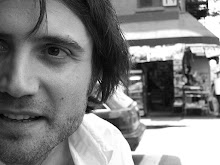2pm @ Douglass Street Music Collective
295 Douglass St. between 3rd and 4th Ave.
Brooklyn, NY
suggested donation $10

The Daniel Kelly Emerge Trio
Daniel Kelly - piano
Brian Ladd - bass
Jordan Perlson - drums
Award-winning composer and pianist, Daniel Kelly has developed a unique and personal approach to jazz, free improvisation and modern chamber music. Daniel has collaborated in performance and on disc with a wide range of artists, including Michael Brecker, Lauryn Hill, Ray Barretto, Don Byron, Bobby Sanabria, William Parker, John Zorn, David Murray, Donny McCaslin, David Binney, Brad Shepik, Joel Harrison, Nestor Torres, Briggan Krauss, Iva Bittova, Candido and many others. He performs regularly with bassist Harvie S and the genre-busting modern chamber ensemble the Bang on a Can All-Stars. Daniel has toured throughout the US, Europe, Southeast Asia, Africa and Central America. In addition to the several CDs he has recorded as sideman, he has recorded highly acclaimed CDs as a leader, including World and Duets with Ghosts which features Daniel’s unique approach to electronic sound manipulation and sampler. Daniel’s third CD Portal is an improvised solo piano suite that arose from his continuing series of improvised solo piano concerts. His quartet was the recipient of the 2007 Chamber Music America/ASCAP Adventurous Programming Award. His fourth CD, Emerge, will be released on Brooklyn Jazz Underground Records.
Daniel serves as the artistic director of the music based non-profit organization Connection Works. Along with founder, Rob Garcia and co-artistic director Michel Gentile, he has organized and helped present workshops for young people and an ongoing series of daylong concerts featuring artists such as Joe Lovano, Fly (with Mark Turner, Larry Grenadier and Jeff Ballard), Dave Liebman, Adam Kolker Trio with John Abercrombie and Billy Hart, Dafnis Prieto Quartet, Yosvany Terry Quartet, Anat Cohen and Howard Alden, Wycliffe Gordon, Nikki Denner Septet with Dave Valentin, Adam Rudolph’s Go Organic Orchestra, Matt Darriau’s Yo Lateef and the Tony Malaby Trio.
Daniel has exhibited his commitment to arts education and young audiences by performing in schools and in artistic multi-media works for family audiences. His most notable collaborator is storyteller David Gonzalez. In addition to performing in hundreds of schools, they have toured to performing art centers throughout the US and Canada and the Royal National Theatre in London. They developed the multi-media theatrical work The Frog Bride, which premiered at the New Victory Theater on Broadway and incorporated Daniel’s music with the music of Russian composer Sergei Prokofiev and video images of paintings by Wassily Kandinsky. It was nominated for a Drama Desk Award in 2006. Daniel composed music for a new collaboration called Wounded Splendor, a multi-media work that is part of the University of Maryland’s “Performance as Politic/Artist as Activist” 2009 season bringing together music with video, poetry and monologues inspired from interviews with activists and experts in the environmental movement. David and Daniel have also been Lincoln Center Institute Repertory artists from 2002-05 and 2008-09.
Daniel was chosen by the US State Department to be a Jazz Ambassador, performing a six-week tour to India, Thailand, Laos, Malaysia, Vietnam and Bangladesh. This highly prestigious honor is only awarded to a few groups each year that travel to developing countries to perform concerts and workshops.
Daniel's talents as film composer can be heard in the films The Receipt, Suzana’s Dreams, Below the Belt (awarded Best Film of the Oregon Film Festival) and the feature film The Legend of Johnson Roebling.
Visit him at www.myspace.com/danielkellymusic and www.danielkellymusic.com.
P R E S S
“Daniel Kelly is a pianist and composer who confidently splits the difference between murky history and sleek progressivism” Nate Chinen, New York Times
"Pianist Daniel Kelly is original and adventurous."
-Howard Mandel, Author of Future Jazz and Miles, Coltrane & Cecil








